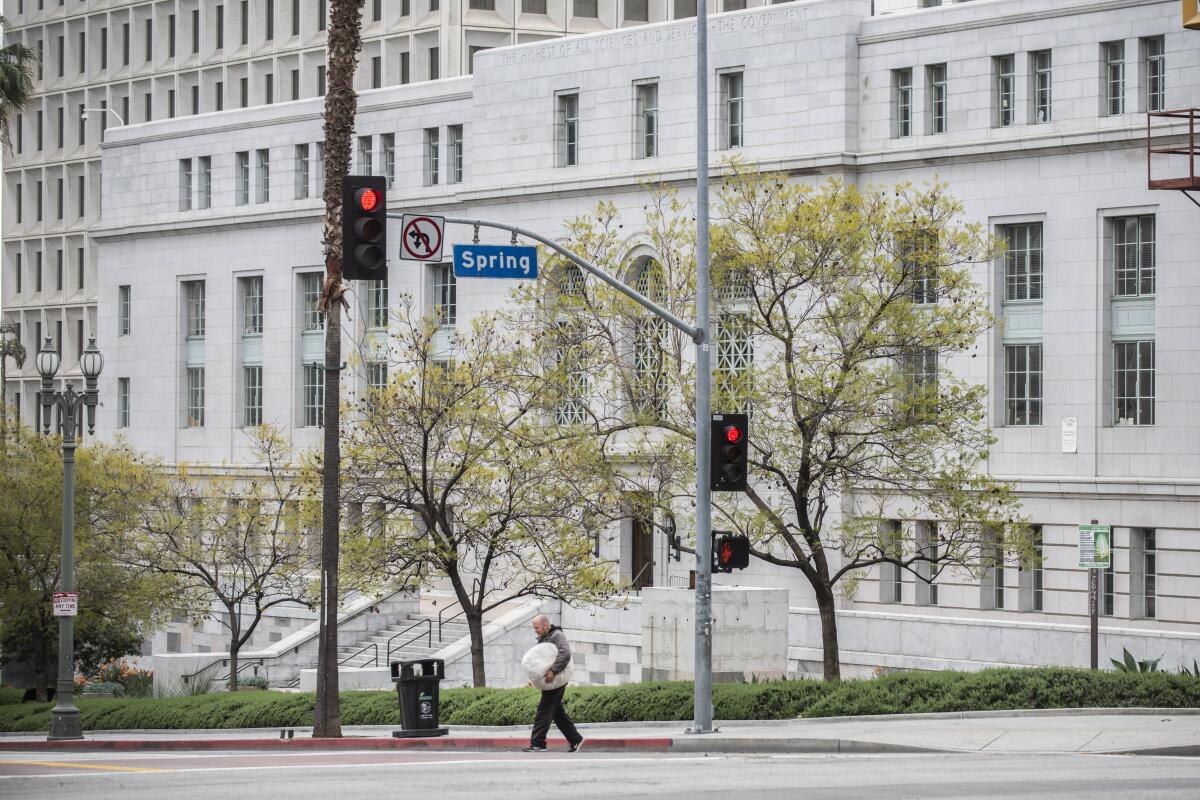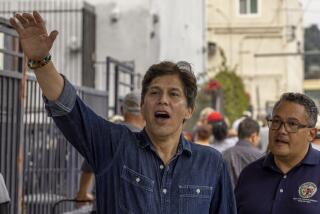Political fundraiser admits to delivering bribes in L.A. City Hall corruption probe

A political fundraiser has agreed to plead guilty to a federal bribery charge for helping a real estate developer pay off a Los Angeles City Council member to clear the way for a major development project.
In a plea agreement filed Thursday, Justin Jangwoo Kim, 53, said he would admit to a count of federal program bribery and agreed to cooperate with an ongoing investigation into corruption at City Hall. Neither Kim nor his attorney could be reached for comment.
Kim is the second person to be charged publicly in a sweeping corruption investigation probing City Hall and real estate development that has been unfolding for more than two years.
Last week, former Councilman Mitchell Englander was indicted on charges that he tried to obstruct an investigation into payments and other gifts he allegedly received from another developer.
A real estate appraiser and consultant, Kim was a top fundraiser for a City Council member whom federal prosecutors referred to as “Councilmember A” in charging documents made public Thursday.
Although they have kept the council member’s identity secret, prosecutors said in court papers Thursday that Kim had helped the unnamed council member carry out a plan to get a relative elected to the City Council because the official’s term was expiring.
Councilman Jose Huizar, who will be termed out in December, spent much of 2018 working to get his wife, Richelle Huizar, elected to his seat. She dropped out of contention after an FBI raid on the couple’s house in November of that year.
The federal filing also says “Councilmember A” had served on the council’s Planning and Land Use Management and Economic Development committees. Huizar served on both in the months leading up to the FBI raid.
Vicki Podberesky, Huizar’s attorney, declined to comment.
A federal search warrant filed in 2018 indicated that agents have been seeking evidence of potential crimes including bribery, kickbacks, extortion and money laundering involving more than a dozen people, including Huizar, Councilman Curren Price and a handful of council aides and political appointees.
The bribery scheme involving Kim began in the summer of 2016, when a labor organization filed a challenge to a proposed residential development in the council member’s district, claiming it violated state environmental law, according to the charging documents filed against Kim.
The labor group’s appeal kept the project from making its way through the city’s approval process, prosecutors said.
The project’s developer, whom prosecutors referred to in court filings as “Developer C,” contacted Kim and asked him to get the council member to help quash the appeal, according to court filings.
Kim, in turn, reached out to someone on the council member’s staff, who is referred to as “City Staffer A-1” in court records.
At the council member’s direction, the staffer told Kim over lunch in early September 2016 that the council member would not provide his help for free and that he “would require a financial benefit,” the filings said.
In early 2017, Kim and the staffer communicated several times, relaying proposals and counter-proposals from the council member and the developer for how much the developer would pay, the court records show.
The staffer initially told Kim it would cost the developer between $1.2 million and $1.4 million to hire a lobbyist who could make the appeal go away, prosecutors said.
Kim returned with an offer of a $500,000 cash payment from the developer and the council member agreed, the filing says. The staffer later told the council member that the council member’s share of the bribe would be $300,000, prosecutors said.
At the same time, the council member and staffer sought help from an unnamed lobbyist who was a “close associate” of the head of the labor group that had filed the appeal, the court records show. The lobbyist agreed to convey to the labor leader that the council member would oppose the appeal, prosecutors said.
Over the following weeks, the council member and staffer both sought private meetings with the lobbyist. On March 3, 2017, the lobbyist sent a text message saying, “Appeal [was] dropped today,” according to the court filings.
The payment of the bribe was not so straightforward, prosecutors said.
In February or March 2017, Kim met with the developer, who gave him $400,000 in cash in a paper bag, according to the court records. Kim handed the bulk of the money to the staffer, but kept an unknown amount for himself as a fee for facilitating the payment, according to the filing.
At a meeting at the council member’s house, the staffer relayed that the developer had paid $400,000 so far and would pay the remaining $100,000 later, prosecutors said.
The staffer then showed the council member a liquor box filled with about $200,000, according to court records. The council member instructed the staffer to hide the cash at the staffer’s house until the council member asked for it, prosecutors said.
A few months later, Kim falsely told the developer that the council member had asked for the remaining $100,000 of the bribe, court filings said. The developer gave the money to Kim, who kept the cash for himself, according to the filing.
Throughout the scheme, the staffer and Kim communicated repeatedly about the need to protect the council member and help the council member’s relative win election once the council member was termed out of office. In one phone call, the staffer told Kim that if the relative were to be elected “we have another 12 years in this city,” according to the court filings.
The following month, the council member spoke with Kim about opening two political fundraising committees for the relative’s campaign. The council member suggested Kim find someone to be “the face” of one of the committees to conceal the council member’s involvement, according to court records.
Whether the council member ever got any money is unclear.
With the FBI poking around, the staffer and council member agreed during a meeting in the council member’s private City Hall bathroom that it was safest for the staffer to hold on to the $200,000 for the time being. Later, the staffer did not respond to the council member’s increasingly agitated demands to meet so he could collect the money, prosecutors said.
“Sounds like u don’t ever want to meet and face up to your commitment to meet,” the council member wrote to the staffer in a text message on Oct. 22, 2018. “U want it all and that’s the real reason why you don’t want to meet.”
Kim is scheduled to appear in court on March 31, when he is expected to plead guilty. He could face up to 10 years in prison, but in their plea agreement, prosecutors agreed to seek some leniency for Kim in exchange for his cooperation in the broader investigation.
More to Read
Sign up for Essential California
The most important California stories and recommendations in your inbox every morning.
You may occasionally receive promotional content from the Los Angeles Times.













